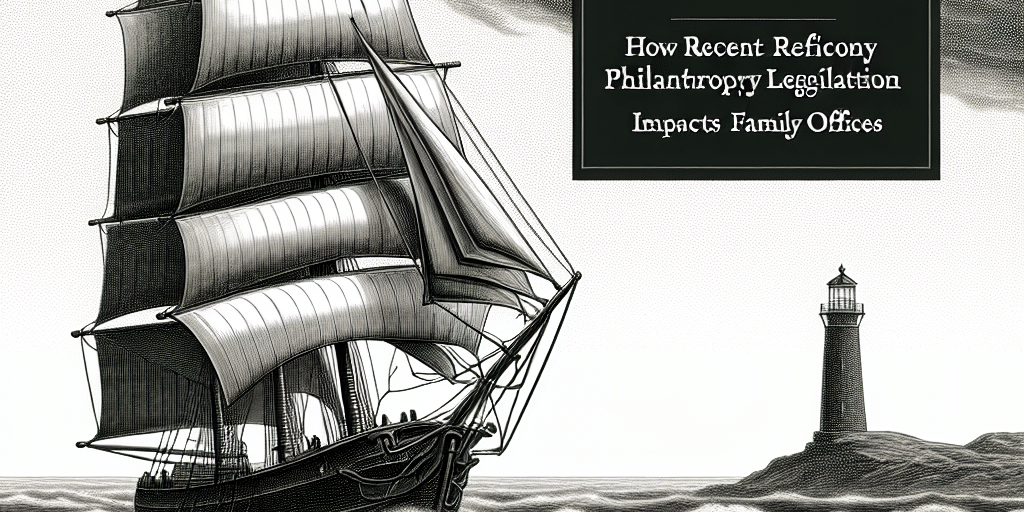Navigating Change: How Recent Philanthropy Legislation Impacts Family Offices
In recent years, the landscape of philanthropy has been undergoing a significant transformation, driven by new legislative measures that seek to enhance the efficacy and transparency of charitable donations. For family offices—private wealth management advisory firms that serve ultra-high-net-worth families—these changes bring both challenges and opportunities. Understanding and navigating the implications of recent philanthropy legislation is paramount for family offices aiming to effectively steward their philanthropic endeavors while ensuring compliance and maximizing impact.
The Evolving Philanthropic Landscape
As charitable giving continues to play a critical role in addressing societal challenges, lawmakers have recognized the need for reforms that promote responsible giving. Recent legislative changes across various jurisdictions (both domestically in the U.S. and internationally) have focused on several key areas, including tax incentives for charitable donations, enhanced reporting requirements, and the regulation of donor-advised funds (DAFs).
Increased Transparency and Accountability: New laws require organizations to provide clearer disclosures regarding their financial activities, ensuring that funds are used effectively rather than accumulating indefinitely. Family offices must be prepared to adapt to these protocols, as failure to comply could result in reputational damage and financial penalties.
Reimagining DAFs: After years of debate concerning the efficacy of donor-advised funds, recent changes have sought to regulate the rate at which DAFs distribute funds. While these vehicles have traditionally provided tax benefits to donors, lawmakers are now promoting a mandated distribution percentage to ensure that charitable dollars are utilized more promptly. Family offices with substantial DAF involvement will need to innovate their giving strategies to align with these new regulations while still achieving their philanthropic missions.
Impact Investing and ESG Focus: Legislative measures are increasingly recognizing the rising trend of impact investing and the importance of Environmental, Social, and Governance (ESG) factors in philanthropic decisions. Family offices must be prepared to integrate these factors, balancing the quest for financial returns with social responsibility—a blend that is becoming essential for long-term sustainability and reputation.
- Tax Implications: Some recent laws have altered the tax incentive landscape, potentially affecting the deduction limits for charitable donations. Family offices may face new challenges in structuring their contributions competitively while considering their overall tax strategy. Staying informed about these changes will facilitate strategic planning around both wealth preservation and philanthropic objectives.
Strategies for Family Offices
Navigating this complex legislative environment requires family offices to adopt agile strategies that not only ensure compliance but also enhance their philanthropic impact. Here are a few recommended strategies:
Engage Legal and Financial Advisors: Seeking expert advice from legal and tax professionals is crucial to understand the full implications of new philanthropy legislation. Family offices should maintain ongoing relationships with advisors to stay updated on changes and develop strategies that safeguard their interests.
Focus on Philanthropic Impact: Implementing rigorous impact measurement frameworks will not only align with new transparency requirements but also enhance the effectiveness of charitable initiatives. Family offices should prioritize projects that demonstrate measurable outcomes and report these results transparently.
Leverage Collaborative Giving: Collaborating with other family offices, donor networks, and social enterprises can amplify impact and streamline compliance processes. Shared resources and insights can foster innovation and enhance the effectiveness of philanthropic initiatives.
Educate Heirs and Family Members: As the next generation takes on leadership roles within family offices, investing in their education on philanthropic responsibility and the implications of new legislation is vital. Engaging the younger generation in discussions about values-based giving will ensure continuity and relevance in the family’s philanthropic mission.
- Emphasize Long-Term Commitments: Given the evolving nature of philanthropy, family offices may consider making long-term commitments to specific causes or organizations. Such strategic partnerships can foster trust and strengthen relationships with grantees, thereby enhancing overall impact.
Conclusion
The recent shift in philanthropy legislation offers both challenges and opportunities for family offices navigating this ever-evolving landscape. By staying informed and adapting strategies to comply with new rules while maximizing impact, family offices can not only protect their interests but also play a pivotal role in shaping a more effective philanthropic ecosystem. As the world faces complex social, environmental, and economic challenges, the role of family offices in driving meaningful change through philanthropy is more critical than ever.











